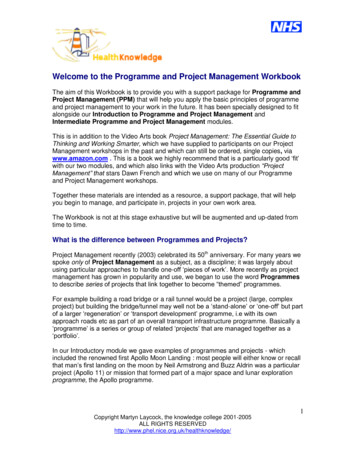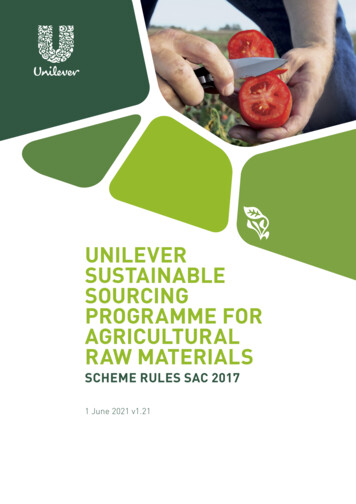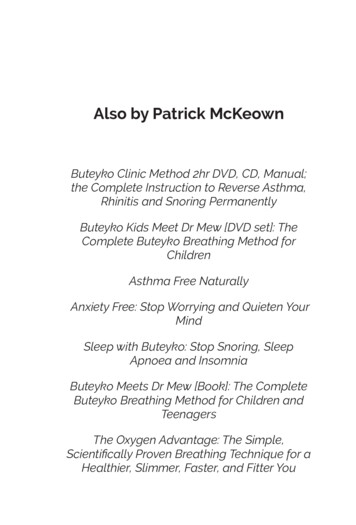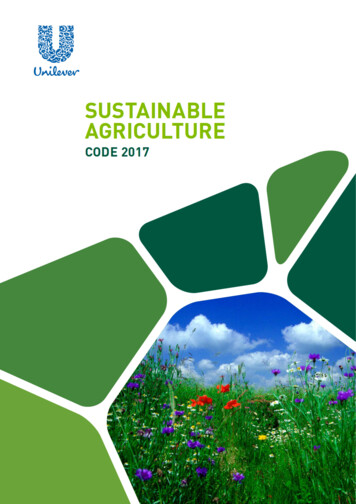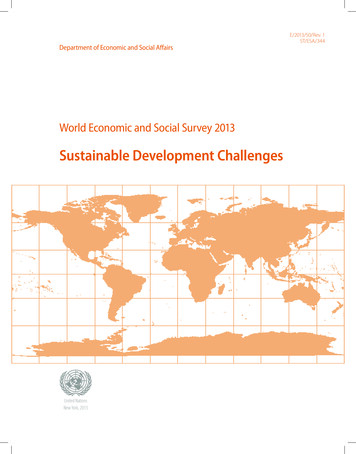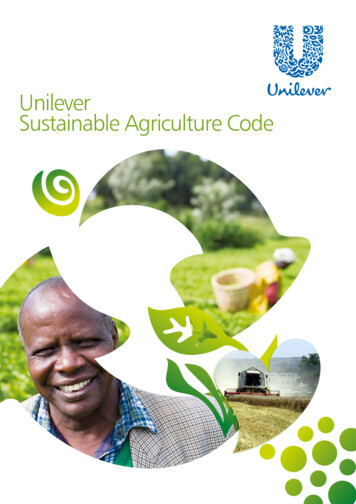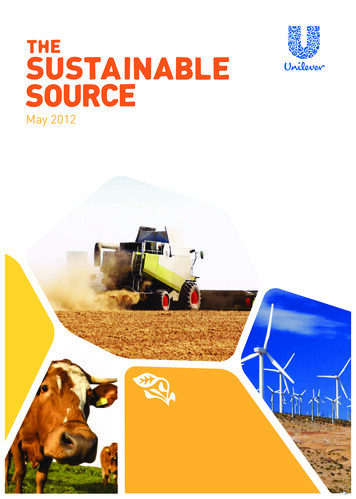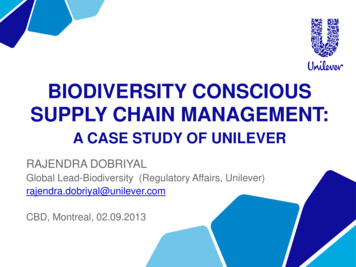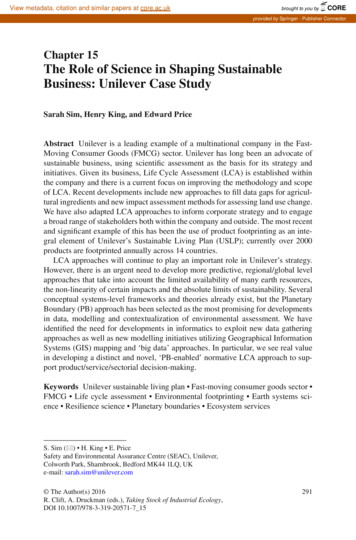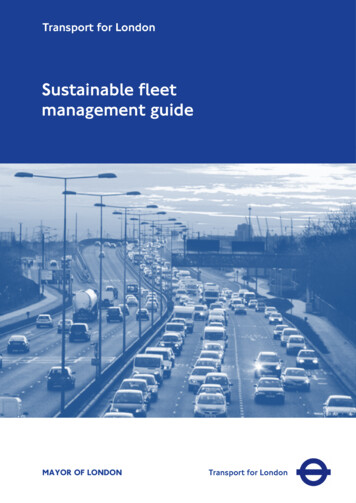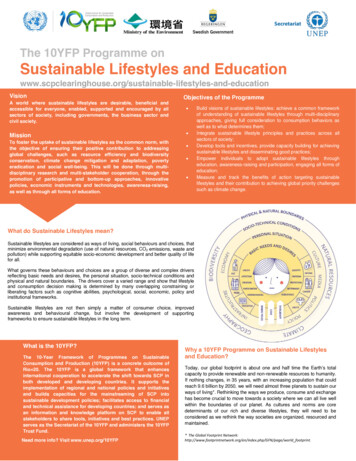
Transcription
The 10YFP Programme onSustainable Lifestyles and styles-and-educationVisionA world where sustainable lifestyles are desirable, beneficial andaccessible for everyone, enabled, supported and encouraged by allsectors of society, including governments, the business sector andcivil society.MissionTo foster the uptake of sustainable lifestyles as the common norm, withthe objective of ensuring their positive contribution to addressingglobal challenges, such as resource efficiency and biodiversityconservation, climate change mitigation and adaptation, povertyeradication and social well-being. This will be done through multidisciplinary research and multi-stakeholder cooperation, through thepromotion of participative and bottom-up approaches, innovativepolicies, economic instruments and technologies, awareness-raising,as well as through all forms of education.Objectives of the Programme Build visions of sustainable lifestyles: achieve a common frameworkof understanding of sustainable lifestyles through multi-disciplinaryapproaches, giving full consideration to consumption behaviors aswell as to what determines them;Integrate sustainable lifestyle principles and practices across allsectors of society;Develop tools and incentives, provide capacity building for achievingsustainable lifestyles and disseminating good practices;Empower individuals to adopt sustainable lifestyles througheducation, awareness-raising and participation, engaging all forms ofeducation;Measure and track the benefits of action targeting sustainablelifestyles and their contribution to achieving global priority challengessuch as climate change.What do Sustainable Lifestyles mean?Sustainable lifestyles are considered as ways of living, social behaviours and choices, thatminimize environmental degradation (use of natural resources, CO2 emissions, waste andpollution) while supporting equitable socio-economic development and better quality of lifefor all.What governs these behaviours and choices are a group of diverse and complex driversreflecting basic needs and desires, the personal situation, socio-technical conditions andphysical and natural boundaries. The drivers cover a varied range and show that lifestyleand consumption decision making is determined by many overlapping constraining orliberating factors such as cognitive abilities, psychological, social, economic, policy andinstitutional frameworks.Sustainable lifestyles are not then simply a matter of consumer choice, improvedawareness and behavioural change, but involve the development of supportingframeworks to ensure sustainable lifestyles in the long term.What is the 10YFP?The 10-Year Framework of Programmes on SustainableConsumption and Production (10YFP) is a concrete outcome ofRio 20. The 10YFP is a global framework that enhancesinternational cooperation to accelerate the shift towards SCP inboth developed and developing countries. It supports theimplementation of regional and national policies and initiativesand builds capacities for the mainstreaming of SCP intosustainable development policies; facilitates access to financialand technical assistance for developing countries; and serves asan information and knowledge platform on SCP to enable allstakeholders to share tools, initiatives and best practices. UNEPserves as the Secretariat of the 10YFP and administers the 10YFPTrust Fund.Need more info? Visit www.unep.org/10YFPWhy a 10YFP Programme on Sustainable Lifestylesand Education?Today, our global footprint is about one and half time the Earth’s totalcapacity to provide renewable and non-renewable resources to humanity.If nothing changes, in 35 years, with an increasing population that couldreach 9.6 billion by 2050, we will need almost three planets to sustain ourways of living*. Rethinking the ways we produce, consume and exchangehas become crucial to move towards a society where we can all live wellwithin the boundaries of our planet. As cultures and norms are coredeterminants of our rich and diverse lifestyles, they will need to beconsidered as we rethink the way societies are organized, resourced andmaintained.* The Global Footprint hp/GFN/page/world footprint.
Structure ofSustainableLifestylesand inableLifestylesand EducationProgrammeThe SLE programme is co-led by the Ministry of the Environment of Japan, the Government of Sweden represented by the StockholmTheSLE programmeis co-ledby Worldthe Ministryof theEnvironmentEnvironmentInstitute (SEI)and theWide Fundfor Nature(WWF). of Japan represented by the Institute for GlobalEnvironmental Strategies (IGES) and the Government of Sweden represented by the Stockholm Environment Institute(SEI).A Multi-stakeholderAdvisoryCommittee(MAC) overseesthe programme’sand implementation.As2014,ofA Multi-stakeholderAdvisoryCommittee(MAC) overseesthe programme’scoordinationcoordinationand implementation.As of s of the MAC include:Governments: TheofforEcology,SustainableDevelopmentEnergy ofof France,of Environmentof Sweden.Governments:TheMinistryMinistrythe EcologicalandInclusive andTransitionFrance,thetheMinistryDepartmentof MinistryofEnvironmentofSweden.International Organizations: UNEP, UNESCO, the United Nations University Institute for the Advanced Study of Sustainability (UNUIAS).International Organizations and EU Institutions: African Union Commission, European Commission, OECD, UNNGOs and businessassociations:AkatuInstitutefor ConsciousConsumption,Businessfor SocialResponsibility(BSR), IntegrativeEnvironment,UNESCO,the UnitedNationsUniversityInstitutefor the AdvancedStudyof Sustainability(UNU-IAS).Strategies Forum, Joint US-China Collaboration on Clean Energy (JUCCCE), Prithvi Innovations, The Responsible EcosystemsSourcing Platform (RESP), Support for Women in Agriculture and Environment (SWAGEN), Tanzania Consumer Advocacy Society,NGOs, private sector and business associations: African Women Agribusiness Network, Akatu Institute for ConsciousUganda Coalition for Sustainable Development, World Resources Forum and WRAP.Consumption, D-mat, Filippa K, IKEA of Sweden, Joint US-China Collaboration on Clean Energy (JUCCCE), One EarthCanada,RedES Colombia,CouncilProductionFor SustainableDevelopment(GRF-SPaC),(WBCSD), WorldResourcesAcademia/research:Global Swechha,Research WorldForum Businesson Sustainableand ConsumptionInstitutefor GlobalForumand WRAP.EnvironmentalStrategies (IGES), Partnership for Education and Research about Responsible Living (PERL) at Hedmark UniversityCollege (Norway), Universidad El Bosque (Colombia), University of Surrey (UK).Academia/research: Berghs School of Communication, Institute for Global Environmental Strategies (IGES), Partnershipfor Education and Research about Responsible Living (PERL) at Hedmark University College (Norway), Rhodes University,Universidad El Bosque (Colombia).Work areas of the Sustainable Lifestyles and Education Programme123Developing and replicatingsustainable lifestyles, including lowcarbon lifestylesEducating for sustainable lifestylesTransforming current and shapingfuture generation’s lifestyles Promoting innovative models and traditional practices ofsustainable lifestylesSupporting conducive policies, infrastructures andeconomic instrumentsBuilding the business case and encouraging responsiblemarket innovation for sustainable lifestyles Mainstreaming sustainable lifestyles into formal education Making sustainable lifestyles a focus in every learningenvironment Mobilizing and empowering youth for sustainable lifestyles Scenarios for sustainable and low-carbon lifestyles Developing frameworks and tools to assess andtrack lifestyles impacts Ensuring and measuring the programme contributionto global priority challengesPromoting innovative and traditional modelsNumerous movements, initiatives and projects have emerged to advance sustainablelifestyles. The SLE Programme supports the implementation, replication and upscalingof such movements in particular in developing countries, by the contribution of theJapanese government and the Trust Fund of the 10YFP. During 2015 and 2016 the SLEidentified innovative and traditional models with potential for being adapted, replicatedand scaled up through two calls for proposals:1. “Implementation and scaling-up of Sustainable Lifestyles and Education”2.“Low-Carbon Sustainable Lifestyles: scaling up and mainstreaming innovativeapproaches”In total 13 projects have been funded through an open call. The projects were firstpublicly presented together at their official launch during the World Circular EconomyForum in Helsinki, in 2017
SLE Projects: Implementation and scaling-up of Sustainable Lifestyles andEducationChile: The objective is to test the potential ofCameroon: This project aims at mobilizing music talentsgeothermal energy to reduce GHG and local pollutantemissions in one of the most polluted regions ofChile. The pilot will involve the local community in thedesign, installation and management of a heatingsystem with a geothermal heat pump for firewooddrying, and a connected greenhouse that will harnessthe energy losses of the dryer to produce vegetables.The project will be aimed at developing a sustainablebusiness model that can be easily replicated.across the ten regions of Cameroon to develop creative andeducational content in the form of music, with participantscompeting for the “Camer- Green Music Award”. The objectivehere is to influence lifestyles and contribute to environmentalsustainability. The winner will be endorsed as a musicambassador for the environment, and will work withimplementing partners to promote using music for theenvironment in Cameroon and beyond.Brazil: The main objective is to raise awareness of consumerism and sustainability among educators and students of severalmunicipal and state primary public schools, as well as their respective communities. The intended results are training courses foreducators, reaching five municipal districts in five geographical regions: Belém, Brasília, Porto Alegre, Salvador and São Paulo.Malaysia: The project aims to ignite the behavioural transition to responsible food consumption and preparation, reducing food waste,as well as improving source separation and composting of food waste. Activities include the development of tools and materials forresponsible food consumption, preparation and waste management, which will eventually allow for replicability in the future. The projectcovers different target sectors such as households, schools, and the hospitality industry.Zimbabwe: The objective is to promote sustainable farming, living and climate change adaptation in rural areas through capacitybuilding activities and the organization of self-support groups. The project will train farmers in nutrition (i.e. what foods they can eat andhow food can be prepared differently) while also training them in how to grow additional crops. They will receive needed hardware input,such as pumps and animals, to support the initiation of this work. In this way, farmers will gain the skills and capacity to produce andconsume more sustainably, while also learning the knowledge to understand the importance of doing so.
SLE Projects: Low-Carbon Sustainable Lifestyles: scaling up and mainstreaminginnovative approachesArmenia: This project aims at promoting sustainable lifestyles in rural communities in Armenia through the use of solar energytechnologies (public lighting, solar water heaters, cooking stoves, and food dryers). Local communities and different stakeholderswill be actively involved in developing and implementing local sustainable development strategies and plans.Colombia: This project aims at enhancing and harnessing a better understanding of low-carbon lifestyles at the city level.Emerging approaches will be tested in Bogota to catalyze action and create replicable urban models. The project adapts research tothe Bogota context, working with local partners to build upon existing policy, initiatives and networks, as well as using a youthsurvey to identify how and what to effectively communicate.Peru, Nicaragua & Honduras: The project will work with major retailers operating in Nicaragua, Honduras and Peru and theirvalue chain partners to implement tried-and-tested sustainable product design tools into new product development (NPD) processes.A ‘Consumer Information Lab’ will also be used concurrently to build capacity and best practices in Latin American organisations forsustainability-led advertising of consumer goods.South Africa: This project involves the trial of a mobileVietnam: The project aims to promote water and energyphone application to reduce food loss and waste from farmsin South Africa. The app connects fresh produce growers inSouth Africa (Greater Cape Town and Eastern Cape) withsecondary markets to divert surplus crop that might otherwisebe sent to low value markets or be discarded.smart lifestyles as an effective strategy towards lowcarbon development. The project blends research,demonstration and education to motivate residents to acton climate change mitigation by leading a low-impactlifestyle.Vietnam: The project aims at upscaling and mainstreamingZambia: The objective is to promote the use of energy-low-carbon sustainable consumption patterns and behavioramongst employees in offices and business premises. Theproject targets office employees in 3 areas: service providers,manufacturers and public organizations. The aim is tocontribute to key consumption domains (energy, waste, water,chemicals, food), reduce environmental impacts and mitigateclimate change in the office setting.efficient technologies among the general public. This isdone through education and capacity-building forteachers and students at basic and university level, aswell as increasing the knowledge of decision and policymakers on the economic viability of energy-savingtechnologies.
Envisioning future low-carbonlifestyles and transitioning instrumentsMonitoring lifestyles impacts andtracking progressWhat makes a lifestyle, how to describe it and how to enable changetowards more sustainable behaviours and choices is often seen as toocomplex and overwhelming questions to address. Therefore, the SLEprogramme will contribute to the development of a common analyticalcriteria and frameworks to visualize transformative ways of living, invarious contexts, for decision-makers to translate sustainablelifestyles’ objectives into concrete actions.Activities developed and carried out under this programme aim ataddressing global and pressing challenges, such as resource efficiencyclimate change mitigation and adaptation, poverty eradication and socialwell-being. This requires the development and application of consistentand integrated tools to measure and track the contribution of programmeactivities to addressing these challenges with a systematic approach.The SLE programme has developed a collaborative monitoring frameworkto highlight the changes in lifestyles, monitor the sustainability of theprojects beyond the SLE and assess the scalability of the SLE projectsEducating for sustainable lifestylesDespite increasing international recognition on Education for Sustainable Consumptionand Lifestyles (ESCL), mainstreaming and implementing ESCL in formal educationcurricula is still a challenge. Various networks, initiatives, and tools have been developedin different regions. However, more efforts are needed to apply, scale up and replicatethem, as well as to support implementation at national and regional levels.Beyond formal education, the programme also covers the non-formal, informal educationand vocational training. Every day, people make decisions in various learningenvironments, including workplaces and homes. Examples where ESCL is brought tothose places are increasing, showing the applicability of ESCL in real life. To advanceESCL beyond formal education, it is fundamental to reinforce public acceptance ofsustainable and low-carbon lifestyles, provide opportunities for learning about systems,processes, choices as well as about their impacts.Making Sustainable lifestyles the “new normal”Our vision is for sustainable lifestyles to be attractive and accessible to individuals andsocieties across the world. But what one makes kind of lifestyle choice more attractivethan another? Choices are often driven by values, cultural and economic. Empoweringindividuals to chose a sustainable lifestyle means tapping into the values that lie behindconsumption (in its broadest terms) and understanding the specific cultural andinstitutional context in which individuals make lifestyle choices.A sustainable lifestyle does not mean compromising your quality of life. Activities suchas playing sports, belonging to a book club or listening to music have been shown tohave benefits for health and well-being. A sustainable lifestyle is an attractive solutionand leads to better health, uses less resources and more happiness.Our aim is to make Sustainable lifestyles, the new normal. The SLE will inspire targetaudiences to create their own attractive, sustainable lifestyle; one that reflects theirvalues and aspirations.
Join the 10YFP SLE Programme!Why should I join?– Access a broad network of organizations and individuals working together on advancingsustainable lifestyles;– Share your experiences and/or resources and learn from others;– Scale up and replicate best practices in your country and region;– Apply for financial support for SLE activities in developing countries through the 10YFPTrust Fund.How can I get involved?The 10YFP Sustainable Lifestyles and Education (SLE) programme is open toorganizations and individual experts interested in joining a collaborative platform tosupport activities that relate to sustainable lifestyles. To know more about theprogramme and how to get involved send an email to the Coordination desk:sl@iges.or.jp or patricia.vilchis.tella@sei-international.orgScan and findout more!Contact the 10YFP Secretariat:C/O UNEP, Division of Technology, Industry and Economics15,ruede ris75015Paris,Email: 10yfp@unep.org@GlobalSCP@10yfpGet the latest news on SLE: Visit the Global SCP ClearinghouseRegister your sustainable lifestyles and education activities and get the latest newson the SLE programme at the Global SCP Clearinghouse:www.scpclearinghouse.orgFollow usFacebook: : https://www.instagram.com/lifestyles10yfp/Twitter: @SEIresearchYoutube:10YFP Sustainable Lifestyles and EducationIntroducing the Coordination DeskThe coordination desk is responsible for the day-to-day running of the programme fromdirectly developing and implementing projects to monitoring and evaluating projectscommissioned under calls for proposals to communicating programme impacts andcontributing to related global processes.June 2017The coordination desk is run by the Institute for Global Environmental Strategies (IGES)on behalf of the Ministry of the Environment, Japan; the Stockholm Environment Instituteon behalf of the Swedish Government; and the World Wildlife Fund for Nature.
Sustainable lifestyles are considered as ways of living, social behaviours and choices, that minimize environmental degrada

